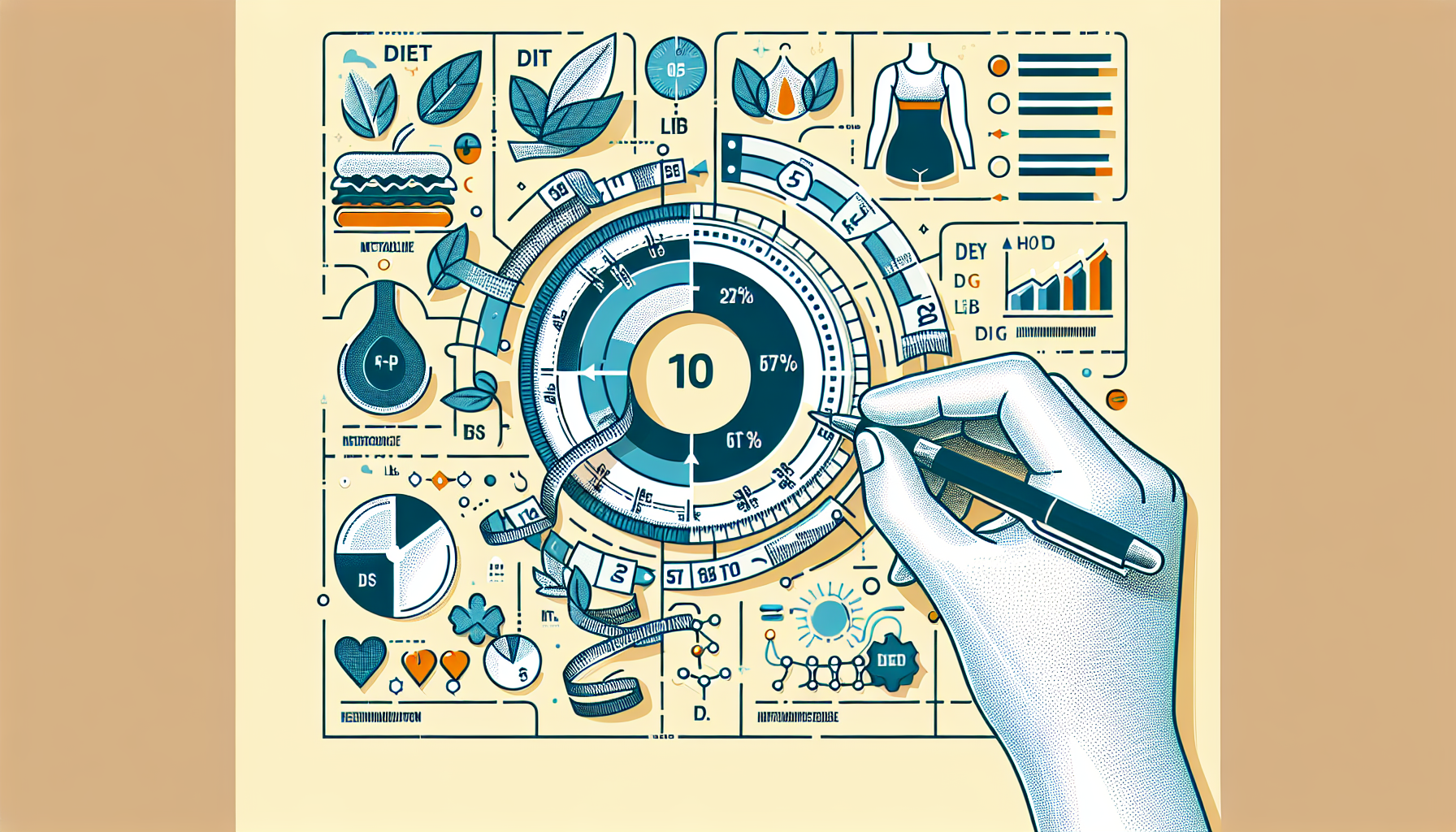Have you ever wondered what is a realistic time frame to lose 10 pounds? Whether it’s for a special event, a personal goal, or just for overall health, shedding those extra pounds can be a challenge. In this article, we will explore different factors that may affect the time it takes to reach your weight loss goal, and provide some tips and strategies to help you achieve it in a realistic and sustainable way. So if you’re ready to embark on your weight loss journey, let’s get started!

Factors That Affect Weight Loss
Metabolic Rate
Your metabolic rate plays a significant role in your weight loss journey. It refers to the number of calories your body burns at rest. Some individuals naturally have a higher metabolic rate, allowing them to burn more calories, while others have a slower metabolism. Factors such as age, genetics, and hormone levels can influence your metabolic rate. To maximize weight loss, it’s essential to understand and work with your unique metabolic rate.
Body Composition
Your body composition, specifically the ratio of muscle to fat, also impacts weight loss. Muscle is more metabolically active than fat, meaning it burns more calories at rest. If you have a higher percentage of muscle mass, you will burn more calories throughout the day. Incorporating strength training exercises into your routine can help you build muscle and improve your body composition, leading to more effective weight loss.
Dietary Habits
What you eat has a significant impact on your weight loss journey. Consuming a balanced and nutritious diet is essential for sustainable weight loss. Focus on incorporating whole, unprocessed foods such as fruits, vegetables, lean proteins, whole grains, and healthy fats into your meals. Avoiding excess sugar, refined carbohydrates, and unhealthy fats can help you create a calorie deficit necessary for weight loss.
Physical Activity Level
Regular physical activity is crucial for successful weight loss. Engaging in both cardiovascular exercises and strength training can help you burn calories, increase your metabolism, and promote fat loss. Aim for at least 150 minutes of moderate-intensity aerobic activity or 75 minutes of vigorous activity each week, along with strength training exercises on two or more days. Find activities you enjoy to make your exercise routine sustainable and enjoyable.
Underlying Health Conditions
Certain underlying health conditions can affect your body’s ability to lose weight. Hormonal imbalances, thyroid disorders, insulin resistance, and certain medications can make weight loss more challenging. If you suspect any underlying health conditions may be impacting your weight loss progress, it’s essential to consult a healthcare professional for appropriate treatment and guidance.
Safe and Sustainable Weight Loss Rate
Recommended Rate of Weight Loss
It is generally recommended to aim for a weight loss rate of 1-2 pounds per week. This rate allows for a gradual and sustainable approach to weight loss. Losing weight too quickly can often result in muscle loss, nutrient deficiencies, and a higher chance of regaining the weight in the future. By setting a realistic and achievable weight loss goal, you are more likely to make long-term changes and maintain your progress.
Benefits of Slow and Steady Weight Loss
Choosing a slow and steady weight loss approach offers several benefits. When you lose weight gradually, your body has time to adjust, and you are more likely to sustain your results. Additionally, slow weight loss allows you to focus on developing healthy habits and making sustainable lifestyle changes, rather than relying on quick fixes or crash diets.
Risks of Rapid Weight Loss
While it may be tempting to opt for rapid weight loss, it is not recommended due to several risks involved. Losing weight too quickly can lead to muscle loss, nutrient deficiencies, gallstones, and a slowed metabolism. Rapid weight loss often involves extreme calorie restriction or restrictive diets, which are not sustainable in the long run. It’s important to prioritize your health and choose a safe and sustainable weight loss rate.
Weight Loss Strategies
Caloric Restriction
Creating a calorie deficit is essential for weight loss. By consuming fewer calories than your body needs, you encourage it to use stored fat for energy. However, it’s important to approach caloric restriction in a healthy and sustainable way. Rather than drastically cutting calories, focus on creating a modest deficit of 500-1000 calories per day. This can be achieved through a combination of dietary changes and increased physical activity.
Healthy Eating Patterns
Adopting healthy eating patterns is crucial for successful weight loss. Rather than following restrictive diets, focus on consuming a variety of nutrient-dense foods in appropriate portion sizes. Incorporate plenty of fruits, vegetables, whole grains, lean proteins, and healthy fats into your meals. Practice mindful eating, listen to your body’s hunger and fullness cues, and aim for balanced and nutritious meals.
Regular Exercise
Regular exercise is a key component of any weight loss journey. Engage in a combination of cardiovascular exercises, such as walking, jogging, or cycling, to burn calories and improve cardiovascular health. Incorporating strength training exercises, such as lifting weights or using resistance bands, can help build muscle and increase your metabolism. Aim for a mix of both types of exercise for overall fitness and weight loss benefits.
Behavioral Changes
A successful weight loss journey often involves making behavioral changes. This may include identifying and addressing emotional or stress-related eating, creating healthy coping mechanisms, and developing positive habits around food and exercise. Consider seeking support from a therapist or counselor to help you navigate any underlying emotional factors that may contribute to weight gain or hinder weight loss.
Tracking Progress
Tracking your progress can be a helpful tool in your weight loss journey. Keep a record of your food intake, exercise routines, and measurements. This can help you identify patterns and make adjustments as necessary. Additionally, tracking progress can provide motivation and a sense of accomplishment as you see improvements over time. Choose a tracking method that works for you, whether it’s a journal, smartphone app, or online platform.
Medical Assistance for Weight Loss
Consulting a Healthcare Professional
If you are struggling to lose weight or have underlying health conditions that may hinder your progress, it is important to consult a healthcare professional. They can provide guidance, support, and personalized recommendations tailored to your specific needs. A healthcare professional will assess your overall health, conduct any necessary tests, and help you create a weight loss plan that is safe and effective for you.
Weight Loss Medications
In some cases, weight loss medications may be prescribed to individuals who have not achieved sufficient weight loss through lifestyle modifications alone. These medications work by suppressing appetite, increasing feelings of fullness, or interfering with the absorption of fat. However, it is important to note that weight loss medications should always be used under medical supervision and in conjunction with a healthy diet and physical activity.
Surgical Interventions
Surgical interventions may be considered for individuals with severe obesity who have not achieved weight loss through other methods. Bariatric surgery, such as gastric bypass or gastric sleeve surgery, can help promote weight loss by restricting food intake or altering the digestive process. These surgical interventions are typically recommended for individuals with a body mass index (BMI) greater than 40 or a BMI greater than 35 with obesity-related health conditions.

Setting Realistic Weight Loss Goals
Gradual Approach
When setting weight loss goals, it is important to take a gradual approach. Aim for a realistic and achievable target, such as losing 1-2 pounds per week. By setting smaller goals, you can celebrate milestones along the way and stay motivated. Gradual weight loss also allows for the development of healthy habits that can be sustained in the long term, promoting overall health and well-being.
Personalized Approach
Everyone’s weight loss journey is unique, so it is important to personalize your goals based on your individual circumstances. Consider factors such as your current weight, body composition, metabolic rate, and underlying health conditions. Consulting with a healthcare professional or registered dietitian can help you create a customized weight loss plan that takes into account your specific needs and preferences.
Long-term Lifestyle Changes
Weight loss should not be viewed as a temporary fix, but rather as a long-term commitment to a healthier lifestyle. To maintain your results and prevent weight regain, focus on making sustainable changes to your eating habits, physical activity levels, and overall lifestyle. Incorporate healthy habits such as regular exercise, balanced nutrition, stress management, and adequate sleep into your daily routine.
Timeline for Losing 10 Pounds
Safe and Realistic Timeframe
Losing 10 pounds in a safe and sustainable way typically takes around 8-10 weeks. This timeframe allows for a gradual approach to weight loss and limits the risks associated with rapid weight loss. Remember that weight loss is not linear, and progress may vary depending on individual factors, such as metabolism and adherence to your weight loss plan.
Example Timelines
While the suggested timeframe for losing 10 pounds is 8-10 weeks, it can vary based on individual circumstances. Here are a few example timelines:
- If you aim for a weight loss rate of 1 pound per week, it would take approximately 10 weeks to lose 10 pounds.
- If you aim for a weight loss rate of 2 pounds per week, it would take approximately 5 weeks to lose 10 pounds.
Keep in mind that these are generalized examples, and individual results may vary.
Adjustments Based on Individual Factors
It’s important to remember that weight loss timelines can vary based on individual factors. Factors such as starting weight, body composition, metabolism, adherence to a healthy lifestyle, and underlying health conditions can influence the rate of weight loss. It’s important to focus on progress rather than comparing yourself to others, as everyone’s weight loss journey is unique.
Tips for Successful Weight Loss
Focus on Overall Health
Instead of solely focusing on the number on the scale, prioritize your overall health. Aim to improve your fitness levels, increase your energy levels, and enhance your overall well-being. By shifting your mindset towards overall health, you will be more motivated to make sustainable changes and maintain your weight loss in the long run.
Create a Supportive Environment
Surround yourself with a supportive environment that encourages healthy habits. Share your weight loss goals with close friends and family members who can offer encouragement and support. Avoid environments or relationships that may hinder your progress or tempt you to make unhealthy choices. Consider joining weight loss support groups or finding an accountability partner to help you stay motivated.
Make Small, Sustainable Changes
Instead of completely overhauling your lifestyle, focus on making small, sustainable changes that you can maintain in the long run. Start by incorporating one healthy habit, such as drinking more water or adding more vegetables to your meals. As you become comfortable with these changes, gradually introduce additional habits. This approach allows for sustainable progress and prevents feeling overwhelmed.
Stay Consistent and Motivated
Consistency is key when it comes to successful weight loss. Stay committed to your goals and make healthy choices consistently, even on days when you may feel less motivated. Remember that progress takes time and that small, consistent steps will eventually lead to significant results. Find sources of motivation that resonate with you, such as tracking your progress, rewarding yourself for milestones, or seeking support from others.
Managing Plateaus and Challenges
Reevaluating Strategies
Experiencing weight loss plateaus is common during a weight loss journey. When progress slows down or stalls, it’s important to reevaluate your strategies. Assess your exercise routine, dietary habits, and overall lifestyle. Consider making adjustments to your calorie intake, exercise intensity, or changing up your exercise routine to challenge your body in new ways. Stay patient and trust the process, as plateaus are often temporary.
Finding Alternative Exercises
If you find yourself losing motivation or experiencing boredom with your current exercise routine, try incorporating alternative exercises. Explore different types of physical activity such as swimming, dancing, or hiking to keep your workouts exciting and engaging. Additionally, consider trying new classes or joining fitness groups that can provide a supportive and motivating environment.
Dealing with Emotional Eating
Emotional eating can pose challenges during a weight loss journey. It’s important to develop healthy coping mechanisms for dealing with emotions and stress that do not involve turning to food for comfort. Consider practicing stress-management techniques such as mindfulness, meditation, or engaging in hobbies. If emotional eating persists, it may be beneficial to seek support from a therapist or counselor who can help you navigate these challenges.
Seeking Support from Others
During challenging times, seeking support from others can make a significant difference in your weight loss journey. Join weight loss support groups, engage in online forums, or reach out to friends or family members who share similar goals. Surrounding yourself with a supportive community can provide motivation, accountability, and a safe space to share your struggles and victories.
Importance of Patience and Self-compassion
Understanding Weight Loss Plateaus
Weight loss plateaus are a normal part of the process, and it’s important to understand that progress may not always be linear. It’s natural for your body to reach a point where it adjusts to your new habits, resulting in temporary weight loss plateaus. Be patient and trust the process, knowing that consistency and perseverance will eventually lead to continued progress.
Avoiding Fad Diets and Quick Fixes
In your weight loss journey, it’s crucial to avoid falling into the trap of fad diets or quick fixes. These approaches often promise rapid weight loss but are not sustainable or healthy in the long run. Instead, focus on making gradual and sustainable lifestyle changes that promote overall health and longevity. Remember that there are no shortcuts to sustainable weight loss.
Focusing on Non-scale Victories
Weight loss is not solely about the numbers on the scale. Celebrate and focus on non-scale victories, such as improved energy levels, increased strength, better sleep, and improved confidence. These achievements are equally valuable and can be powerful motivators to continue your weight loss journey. Remember that the scale is just one measure of progress and does not define your worth or success.
Maintaining Weight Loss
Transitioning to Maintenance Phase
Once you have reached your weight loss goals, it’s important to transition into a maintenance phase to sustain your progress. Gradually increase your calorie intake to match your energy needs, while still maintaining healthy habits. Focus on making long-term lifestyle changes that prioritize balanced nutrition, regular physical activity, stress management, and self-care.
Establishing Healthy Habits
To maintain weight loss, establish healthy habits that become part of your daily routine. Continue to prioritize regular exercise, balanced and nutritious meals, and adequate hydration. Incorporate strategies such as meal prepping, planning your workouts in advance, and monitoring your food intake to stay on track. These habits will help you maintain your weight loss in the long term.
Continuing Regular Physical Activity
Maintaining regular physical activity is crucial for weight maintenance and overall health. Aim for at least 150 minutes of moderate-intensity aerobic activity or 75 minutes of vigorous activity each week. Additionally, continue incorporating strength training exercises to preserve muscle mass and support a healthy metabolism. Choose activities that you enjoy and make physical activity a regular part of your lifestyle.
In conclusion, weight loss is a journey that is influenced by various factors, including metabolic rate, body composition, dietary habits, physical activity, and underlying health conditions. To achieve safe and sustainable weight loss, it is important to set realistic goals, implement effective weight loss strategies, and seek medical assistance when necessary. Patience, self-compassion, and maintaining a supportive environment are vital throughout the process. Remember that successful weight loss is not just about the numbers on the scale but also about overall health and well-being. Aim for gradual progress, prioritize long-term lifestyle changes, and stay consistent and motivated to achieve and maintain your weight loss goals.



